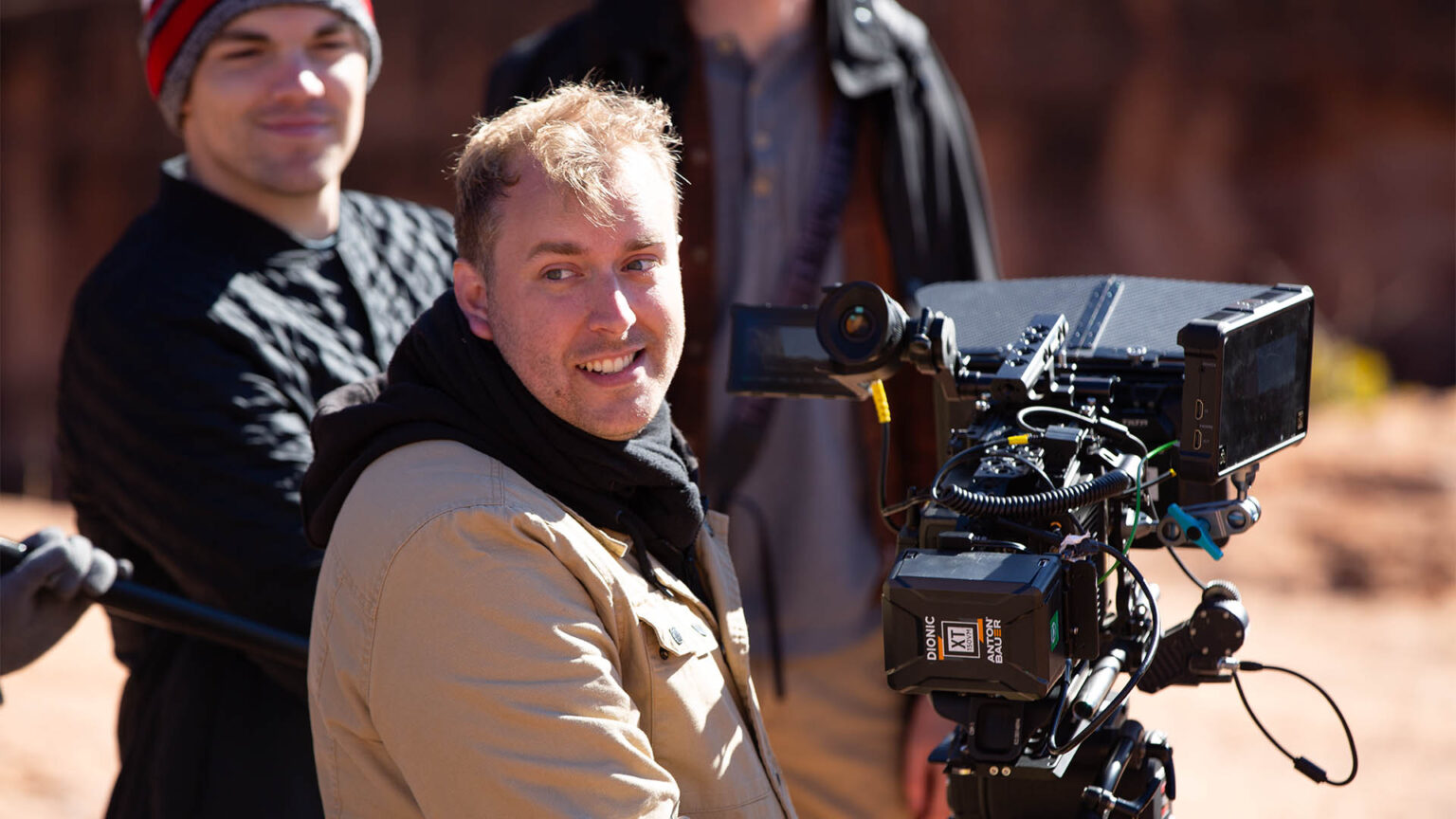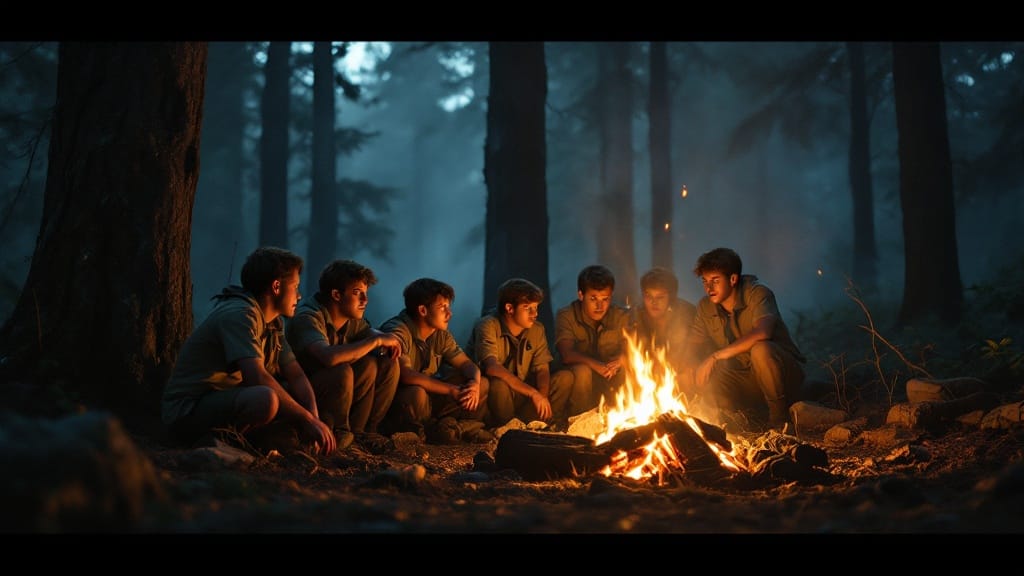Drama
Still

You never know when inspiration will hit. For Steven Bartholomew, he came up with his latest movie idea for “Still” through a casual conversation with a friend while hanging out at the swimming pool.
“He asked me how I came up with film ideas, and then an image of a man’s dried, cracked lips in the desert came to me” said Bartholomew. “I told him about the quick brainstorm. When I went home I couldn’t get this idea out of my head. Why was he in the desert? Why was he stuck there? What was he searching for? That resulted in the story of him going and photographing the night sky for his girlfriend out in the desert.”
The film’s connection to reality became eerily tangible when Bartholomew’s father faced a health crisis. “My dad had afib… and had to go in for a minor surgery,” he recounted. The filmmaker found himself unwittingly mirroring the events of his creation, taking pictures of the moon during a pivotal moment only to receive a text about his father’s temporarily stopped heart.
Tragedy struck again as Addie Morgan Provost, a friend and the film’s intended lead actress, passed away in a car accident. This devastation prompted Bartholomew to reevaluate and refine the script to honor her memory and due to of the feedback he received from her before her passing.
The third challenge faced by Bartholomew was one of a spiritual nature. The insight he learned from the experience helped refine “Still” further. “This experience helped me better understand the pain and confusion that John was going through with God. Why didn’t he save Mattie? Because He had a different plan. One that would help everyone grow even if it hurt.”
“The film was inspired from a random thought of a man lost in a desert, but became real after my father’s heart surgery, a friend’s passing, and my own deserts.”
As production began the challenges felt as vast as the desert landscapes they navigated.
“It was difficult to haul equipment to our remote locations, manage camera batteries and media, as well as experience the cold. But the locations were breathtaking and I believe that we captured God’s presence in the frame, so that made the diverse weather, sleeping in tents, and the three mile hike more than worth it. But that was still really hard.”
Making a movie is challenging but yet incredibly rewarding. When looking back on the experience Bartholomew remarked, “I think I would have planned more as a director. There was never enough time to write and rewrite the script, draw storyboards (our shotlist helped), and jot down all the actors’ tactics. I think I planned as much as I could while doing school full time. There’s probably small things here and there that I would go back and change, but honestly for what we had I think we killed it.”
The best way to learn is to seek the advice of those that came before. Bartholomew offered “Make as much stuff as you can! The 10,000 hour rule really does seem to exist! If you’re constantly working on passion projects, school projects, friend’s projects, paid projects, you will thrive.
In addition “Find yourself a mentor!! That isn’t someone looking for your money, but rather a trusted friend and advisor who wants to give back to the community. Someone who makes stuff you want to make.”
And Bartholomew parting advice is “Network like crazy! Connect with everyone in the room, ask them what help they need on their projects and then go help! Other people know that networking is part of the process in film so don’t be afraid of talking with anyone. I’ve had breakfast with an executive producer of a hit TV show simply by asking, “Can we get lunch and chat?” and you can too.”
Bartholomew invites audiences to connect with him on Instagram @steviewonderfilm and explore his work on stevenbartholomew.com.
Comedy
Troop 458

WARNING! This review contains SPOILERS!
Troop 458, written by Trevor Allen, captures the often daunting, yet transformative, experience of being the new kid in a world full of unknowns. We follow Sidney, an anxious boy thrown into his first Boy Scouts campout, where he faces both the perils of acceptance and the strangeness of his eccentric scout leader. As spooky campfire tales start to weave into reality, Sidney is forced to confront his fears head-on, finding moments of humor, adventure, and unexpected camaraderie along the way.
I like the concept of Troop 458 because it blends coming-of-age themes with a playful sense of adventure, all wrapped in an atmosphere tinged with just the right amount of mystery. Allen’s writing brings to life a cast of memorable characters, especially through Sidney’s journey of growth. The tension between humor and fear feels authentic to the Boy Scouts’ setting, and it captures the real challenges kids face when trying to fit in.
What resonated with me most was the screenplay’s exploration of courage—not just in facing mythical dangers but in embracing who you are, quirks and all. Some aspects could benefit from a clearer focus on character motivations and tighter pacing to keep the momentum strong, particularly during scenes that blur the line between myth and reality.
The dialogue is great in many places, offering humor that feels natural for a group of young scouts. There were moments where I felt the conversations could be a bit sharper or more distinct to heighten the comedic or emotional impact. Character development is a strong suit, with Sidney’s evolution being both relatable and satisfying, but secondary characters could have a bit more depth to elevate the ensemble.
Allen’s Troop 458 is polished, with solid grammar, spelling, and formatting that adhere to professional standards. The structure is clean and makes for an easy read, setting up scenes that are visually compelling.
Troop 458 delivers an enjoyable mix of humor, heart, and a touch of the supernatural, leaving me eager to see how it might come to life on screen.
Drama
Ellie

WARNING! This review contains SPOILERS!
Directed by Marcus Mejia
Ellie is a refreshing experience that pulled me right into the world of a young, shy man navigating a work meeting while secretly yearning for a bit of magic in his everyday life. We’re taken through his imaginative, musical daydream—a beautiful escape from reality that reveals his true desires. I loved how the film peeled back layers of his personality without a single word of dialogue. Instead, the music carried the narrative, and surprisingly, it worked so well.
Marcus Mejia did an excellent job blending dramedy elements to keep the film engaging. The moments of humor and more emotional beats make the film feel well-rounded. Mejia’s choice to swap dialogue for music was a bold move, and it paid off. I could feel the character’s internal struggles and hopes as the music brought out emotions words couldn’t.
The lighting felt intimate, almost like it was giving us a window into the protagonist’s soul, and the cinematography perfectly captured the whimsical tone of his daydreams. I noticed how smoothly the editing transitioned between reality and fantasy, which made the story’s pacing feel just right. The sound design was on point, with every beat of music syncing beautifully with the character’s emotional highs and lows.
I loved when the protagonist’s daydream overlapped with reality, creating this seamless blend that felt so relatable. I admired how it portrayed the quiet, unspoken dreams we all carry. It was a reminder of the power of our inner worlds and how much magic lies just beneath the surface of our everyday lives.
Ellie left a gentle yet lasting impression. It’s a unique, heartfelt short film that shows how creative risks can pay off. Ellie is a memorable journey that’s definitely worth the watch.
Drama
Finding Acceptance

Directed by Andrew DeBennett
WARNING! This review contains spoilers.
Watching “Finding Acceptance” was an experience that brought me back to those anti-bullying films we’d see in school assemblies. The story follows Mary, a new student in a wheelchair, navigating the often-tough world of school friendships. Initially, she faces teasing from her peers but finds a genuine friend in Liz, who even manages to extend kindness to Mary’s bully, Max. The message is straightforward and clear: acceptance and empathy matter.
I could see what the director was aiming for—Andrew DeBennett notes that the film was both a joy to create and a personal project. The heart of the story shines through, with Kaylah Pollock (Mary) and Laney Hansen (Liz) bringing warmth to their roles. Their connection feels genuine, even if the overall story feels a bit too familiar.
Technically, the film could have used some fine-tuning. The sound mix was rough, with the music often drowning out dialogue. The editing also felt choppy, making it harder to stay immersed in the story. The dialogue leaned into clichés—phrases like “loser” felt outdated and took away from the realism. The cinematography, however, was a bright spot, creating a warm, inviting feel that suited the film’s positive message.
I felt like the story could’ve benefited from more depth. The bullying that Mary faces is minimal, making her eventual friendships feel somewhat predictable. For younger audiences, this simplicity might be engaging and easy to digest, but it misses the chance to delve into the more complex aspects of acceptance.
In the end, “Finding Acceptance” delivers a positive, albeit simple, message. While it didn’t connect with me on a deeper level, I can see it being a useful film for educational settings, especially for younger viewers learning about kindness and friendship.










